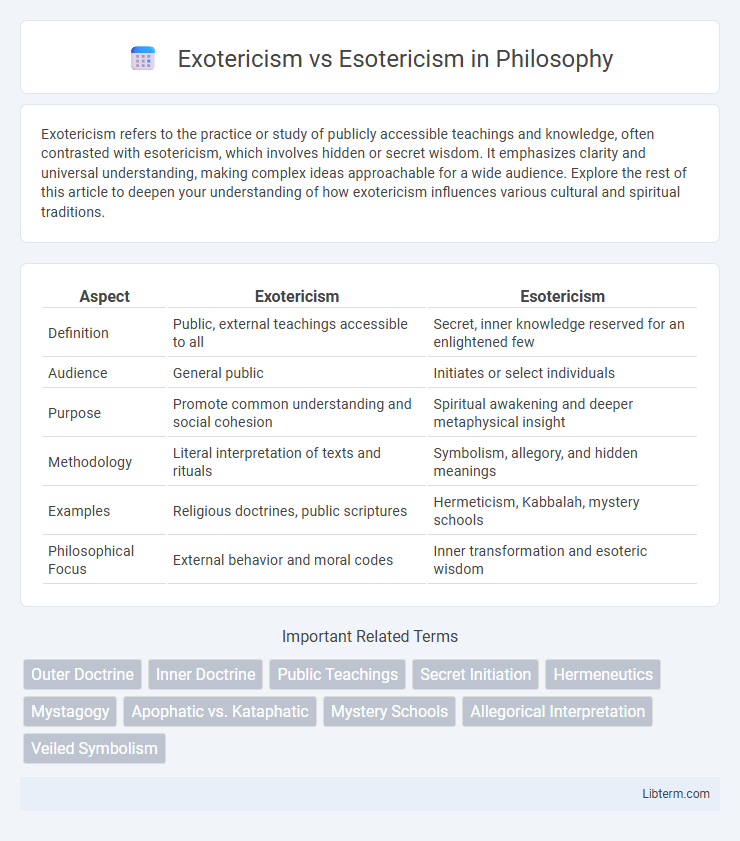Exotericism refers to the practice or study of publicly accessible teachings and knowledge, often contrasted with esotericism, which involves hidden or secret wisdom. It emphasizes clarity and universal understanding, making complex ideas approachable for a wide audience. Explore the rest of this article to deepen your understanding of how exotericism influences various cultural and spiritual traditions.
Table of Comparison
| Aspect | Exotericism | Esotericism |
|---|---|---|
| Definition | Public, external teachings accessible to all | Secret, inner knowledge reserved for an enlightened few |
| Audience | General public | Initiates or select individuals |
| Purpose | Promote common understanding and social cohesion | Spiritual awakening and deeper metaphysical insight |
| Methodology | Literal interpretation of texts and rituals | Symbolism, allegory, and hidden meanings |
| Examples | Religious doctrines, public scriptures | Hermeticism, Kabbalah, mystery schools |
| Philosophical Focus | External behavior and moral codes | Inner transformation and esoteric wisdom |
Understanding Exotericism and Esotericism
Understanding exotericism involves recognizing it as the public, external expression of religious or philosophical doctrines, accessible and intended for the general population. Esotericism, in contrast, pertains to hidden, specialized knowledge reserved for a select few, often requiring initiation or advanced study to comprehend its deeper symbolic meanings. Both play crucial roles in the transmission of spiritual teachings, where exotericism establishes communal beliefs and esotericism offers profound inner insights.
Historical Origins of Exoteric and Esoteric Traditions
Exotericism and esotericism trace their historical origins to ancient religious and philosophical traditions where exoteric teachings represented publicly accessible doctrines, while esoteric knowledge was reserved for initiates or select individuals. Ancient mystery schools in Egypt and Greece exemplify early esoteric traditions, emphasizing hidden wisdom conveyed through symbolic rituals and allegories, whereas exoteric practices aligned with communal worship and moral codes. This duality shaped subsequent religious systems, including Gnosticism and early Christianity, influencing the development of both open, doctrinal beliefs and secretive, mystical interpretations.
Core Principles of Exotericism
Exotericism centers on outward knowledge that is accessible to the general public, emphasizing universal truths and moral teachings that promote social cohesion and ethical behavior. It relies on clear, structured doctrines and practices designed to be easily understood and practiced by large communities. This approach contrasts with esotericism's focus on hidden knowledge reserved for select initiates.
Fundamental Concepts in Esotericism
Fundamental concepts in esotericism include the pursuit of hidden knowledge, spiritual transformation, and the belief in an inner reality beyond the physical world. Esotericism emphasizes symbolic interpretation, initiation rites, and the study of mystical traditions to access higher wisdom. This contrasts with exotericism, which focuses on outward, public teachings and widely accessible religious practices.
Key Differences Between Exotericism and Esotericism
Exotericism refers to publicly accessible teachings and practices intended for the general population, often emphasizing external rituals and moral guidelines. In contrast, esotericism involves hidden, inner knowledge reserved for a select group of initiates, focusing on mystical or spiritual insights beyond ordinary perception. The key differences lie in their accessibility, purpose, and depth of understanding, with exotericism prioritizing communal norms and esotericism emphasizing individual spiritual transformation.
Influence on Religious and Spiritual Practices
Exotericism shapes religious and spiritual practices by promoting accessible doctrines and communal rituals aimed at a broad audience, fostering collective identity and shared moral frameworks. Esotericism influences these practices through secret teachings and individualized spiritual experiences, emphasizing inner transformation and mystical knowledge reserved for initiates. Both approaches impact the development and diversity of religious traditions by balancing public orthodoxy with private, experiential wisdom.
Exotericism in World Religions
Exotericism in world religions refers to the outward, public teachings and practices accessible to all adherents, such as communal worship, moral codes, and ritual observances found in Christianity, Islam, Buddhism, and Hinduism. These exoteric elements emphasize clear, standardized doctrines designed for broad understanding and social cohesion, often codified in sacred texts like the Bible, Quran, and Vedas. The exoteric dimension contrasts with esotericism by promoting inclusivity and external expression of faith through prescribed rituals and ethical conduct.
Esotericism in Mystical and Occult Movements
Esotericism in mystical and occult movements centers on hidden knowledge and practices accessible only to initiates, emphasizing spiritual transformation and inner enlightenment. These traditions often incorporate symbolism, ritual magic, alchemy, and hermetic philosophy, aiming to unlock deeper cosmic truths beyond ordinary perception. Such esoteric teachings contrast sharply with exotericism, which focuses on publicly available knowledge and external religious practices.
Modern Interpretations and Misconceptions
Modern interpretations of exotericism emphasize its role in accessible, public teachings and widely accepted doctrines within religious and philosophical traditions. Esotericism is often misunderstood as mere mysticism, but it encompasses specialized knowledge intended for a select audience, including practices like alchemy, occultism, and Gnosticism. Misconceptions arise when esoteric concepts are either oversimplified or sensationalized, overshadowing their historical context and nuanced philosophical frameworks.
The Relevance of Exotericism and Esotericism Today
Exotericism and esotericism remain highly relevant today as they address different approaches to knowledge and spiritual understanding, with exotericism promoting accessible, public teachings and esotericism offering hidden, inner wisdom reserved for advanced seekers. In modern spiritual and philosophical contexts, exoteric practices support communal learning and ethical guidance, while esoteric traditions foster personal transformation and deeper mystical insights. The coexistence of both paths enriches contemporary discourse on belief systems, self-awareness, and cultural heritage.
Exotericism Infographic

 libterm.com
libterm.com